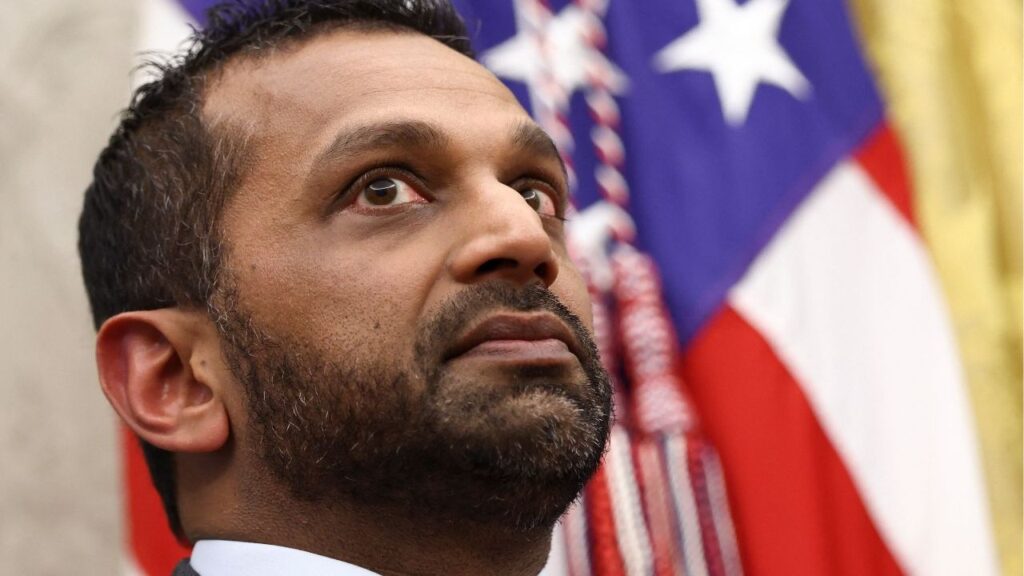Nicholas Fuentes, the notorious white nationalist social media personality, in his streaming studio on Sept. 8, 2025. For much of Donald Trump’s second term, the political heirs of his “America First” agenda have tried to exclude overt bigotry out of the coalition. With the rise of Fuentes and his racist and antisemitic “Groyper” movement, some fear the exercise has failed. (Jamie Kelter Davis/The New York Times)

- Tucker Carlson’s interview with white nationalist Nick Fuentes ignites fierce backlash, exposing deep fractures within the Republican Party’s identity.
- Conservatives clash over nationalism’s future as Fuentes’ racist ideology collides with efforts to redefine “America First” without overt bigotry.
- GOP leaders condemn Fuentes’ rise while some warn his influence reflects a broader shift within national conservatism’s growing mainstream.
Share
|
Getting your Trinity Audio player ready...
|
For much of President Donald Trump’s second term, the political heirs of his “America First” agenda have tried to form an intellectual framework for their movement that embraces nationalism while keeping overt bigotry out of the coalition.
With the rise of Nick Fuentes, a 27-year-old white nationalist, and his young, racist and antisemitic “Groyper” movement, some fear the exercise has failed.
The struggle and its stakes for the nation burst into view after conservative commentator Tucker Carlson last week offered a friendly interview to Fuentes, an avowedly racist antisemite. The interview triggered rounds of acrimony and recriminations on the American right.
Mainstream Republicans have described Fuentes’ ascendance as a sudden surprise. But others — including some on the right — see it as a natural evolution within the movement that has come to be known as “national conservatism,” whose adherents embrace an American identity based not on the ideals of the nation’s founders but on the centrality of Christianity and familial ties to the land.
National conservatism adheres to a belief that American society lost its moorings when it drifted from a core power structure centered on the Christian white men who founded the nation and instead embraced diversity, multiculturalism and feminism. The movement’s statement of principles eschews the racist ideology espoused by Fuentes. It also rejects “globalism” and believes immigration has weakened the country.
“The distance between Fuentes and the mainstream Republican Party isn’t really that large,” said Richard Hanania, a conservative writer who once posted under a pseudonym in white supremacist forums. (He has since renounced his past writings.)
The interview on “The Tucker Carlson Show,” in which Fuentes called for an exclusive, “pro-white,” Christian movement and said that “organized Jewry” undermines American cohesion, was denounced by high-profile elected Republicans including Sens. Ted Cruz of Texas, Josh Hawley of Missouri and Mitch McConnell of Kentucky, and Rep. Mike Johnson of Louisiana, the House speaker.
But while prominent voices in the national conservatism orbit, such as Vice President JD Vance, have never embraced Fuentes, some of the ideas they have espoused have similarities to Fuentes’ ruminations on splintering societal cohesion.
Vance has fretted about what he has called “social solidarity.” In an interview in May with New York Times Opinion columnist Ross Douthat, he said, “I’m trying to preserve something in my own country where we are a unified nation, and I don’t think that can happen if you have too much immigration too quickly.”
Fuentes and his explicit bigotry have been causing the Republican Party heartburn for years, including when Trump dined with him and rapper Ye, formerly known as Kanye West, at Mar-a-Lago in 2022. Now, as Cruz put it, the GOP faces a time of choosing.
“This is a poison, and I believe we are facing an existential crisis in our party and in our country,” Cruz said at the Republican Jewish Coalition’s annual summit last week.
Matt Brooks, the Republican Jewish Coalition’s CEO, said Carlson hosted “a fawning interview” that failed to hold Fuentes accountable for his “virulently antisemitic and racist comments” and his “adulation of Adolf Hitler and denial of the Holocaust.”
Trump has said nothing publicly about Fuentes’ interview, nor has Vance, who is personally close to Carlson.
The president of the Heritage Foundation, Kevin Roberts, stoked the controversy when he posted a formal video to proclaim, “We will always defend our friends against the slander of bad actors who serve someone else’s agenda.”
“That includes Tucker Carlson, who remains and, as I have said before, always will be a close friend of the Heritage Foundation,” he continued. (He followed up with a statement listing a number of disagreements he has with Fuentes, and then an apology on Wednesday for his initial statement at a forum with Heritage employees that revealed still more divisions. Roberts’ chief of staff resigned over the flap.)
The New York Times reached out to Carlson for comment but did not receive a response. Fuentes initially agreed to be interviewed, but he never followed up.
Sam Tanenhaus, a biographer of William F. Buckley Jr., who was the editor of the conservative magazine National Review, called this moment a struggle over legitimacy, identity and cultural power.
Fuentes often picks fights with the Republican establishment. His interview with Carlson was actually tame by the standards of his own streaming show. His views on Vance and his marriage to Usha Vance, a Hindu Indian American, have been incendiary, replete with references to “race mixing,” mockery of their son’s Indian name and even the vice president’s weight.
While he told Carlson it was important that he reassure Americans that he wants to achieve his pro-white aims through peaceful means, his violent rhetoric and rants about “perfidious Jews” belie that goal.
Of late, however, he has shifted from intolerant provocation to threatening triumphalism.
Fuentes last week said on his podcast that if Vance seeks the Republican presidential nomination in 2028, he will put him in what he called the “Groyper squeeze.”
“If Vance condemns the Groypers, we are deploying to Iowa,” Fuentes said. “I swear I’m going to move to Iowa and New Hampshire and Nevada and South Carolina and one primary after the next.”
He told Carlson, “Now that everyone agrees with me, I will graciously forgive them for being so hostile.”
Many of the ideas that were once considered fringe, such as viewing immigration as a major threat to American society and opposing foreign interventionism, have become mainstream within the Republican Party, Hanania said.
—
This article originally appeared in The New York Times.
By Clyde McGrady/Jamie Kelter Davis
c. 2025 The New York Times Company


















